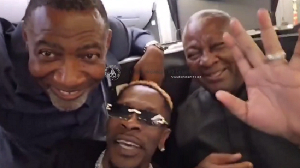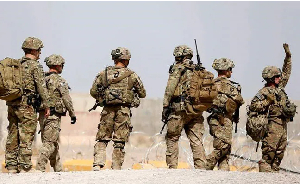- Home - News
- TWI News | TV
- Polls
- Year In Review
- News Archive
- Crime & Punishment
- Politics
- Regional
- Editorial
- Health
- Ghanaians Abroad
- Tabloid
- Africa
- Religion
- Election 2020
- Coronavirus
- News Videos | TV
- Photo Archives
- News Headlines
- Press Release
General News of Tuesday, 1 May 2012
Source: The Citizen Newspaper
African Union Hails Kwame Nkrumah In Addis Ababa
… But Is The Man At Peace?
By Samwin Banienuba
In January 2012, a bronze statue of Osagyefo Dr Kwame Nkrumah was unveiled amid pomp and
Splendour at the opening of the African Union's new headquarters in Addis Ababa, Ethiopia.
It was in tribute to the architect of the African personality, the commander in chief of continental liberation, the father of African nationalism, and the truest visionary of African unity. Very few statesmen have attempted or achieved so much as Nkrumah did in Africa.
He is the founder of modern day Ghana, the first African country south of the Sahara to achieve independence from colonial rule. He was largely responsible for this historic feat and stands out as an intellectual par excellence, an organisational genius, a political Maradona if you like and a pioneering and iconic Pan-Africanist.
Ghanaians who woke up to independence 55 years ago on 6th March 1957 will forever remember the clarion reminder of their leader that "The Independence of Ghana is meaningless unless it is linked up to the total liberation of Africa". With these messianic words Nkrumah’s vision for the nation and that of the continent became minted both intrinsically and immediately. He was a man in a hurry and he had his work cut out for him. With spontaneous alacrity he set about reconstructing Ghana, helping to liberate the rest of Africa and strategizing to unite the continent.
Nkrumah’s times were the days of the bipolar world when international relations were defined by
Capitalist and Communist democracies or East and West geopolitics. This was an either-or tight rope, for which Nkrumah elected to face forward only; not backward, not east and not west. His ardent believe in alternative development strategies for the ‘third world’ coupled with his conviction that neo-imperial forces remained at work within the established systems conjoined him with others to launch the Non-Aligned Movement in 1961. Today the countries of the Non-Aligned Movement are said to represent nearly two-thirds of the United Nations and some 55% of the world population.
It was however in Africa that the passion of Nkrumah manifested its fullest expression. At independence many leaders of the new emerging nation-states saw nothing wrong with maintaining the European imposed boundaries. With the shadows of their colonial masters still lingering over them or with faculties fettered by assimilation and the trappings of power such leaders felt comfortable in a balkanised Africa, totally impervious to the fact that it was testimony to the covetous and imperial appetite with which Africa had been preyed upon. Nkrumah knew better in typical visionary foresight.
He called his peers to reason and articulated the view that only a united Africa could survive the
conflictual world of interests. In his Class Struggle in Africa he argued that “The community of economic life is the major feature within a nation, and it is the economy which holds together the people living in a territory. It is on this basis that the new Africans recognise themselves as potentially one nation, whose domination is the entire African continent." This was always the foundation of his zealous Pan-African effort and he was instrumental in getting the Organisation of African Unity (OAU) established in 1963 as a vehicle for the unification of Africa and Africans.
In all, 30 nations collectively founded the OAU. In reality very few were persuaded of the need to give up some sovereignty for the sake of continental unity. For Nkrumah, the OAU was far short of the United States of Africa he envisioned. No independent African State had any chance of following an independent course of economic development without been ruined by the former colonial rulers.
Unless Africa had a unified policy working at the continental level the state of affairs was unlikely to change. He foresaw an Africa shackled and imperiled without unity. Yet his peers raised eye brows with a yawn when he called for a common market, a common currency and a common defence system for the survival of the continent in those early ‘60s.
Almost to a fault Nkrumah was selfless and dedicated his life entirely to the cause of Africa. He never wasted time in demonstrating that unity was the only guarantee for harnessing the resources of Africa for Africans and bequeathing the wealth of the continent for the benefit of the descendants of Africa. Notwithstanding this unqualified commitment, Nkrumah was overthrown in a coup nine years into his leadership amidst jubilant celebrations by his compatriots. He was accused of being authoritarian and for failing to deliver milk and butter on the tables of Ghanaians.
It was not until the dust settled that it became clear Nkrumah was overthrown because the CIA wanted it so. He was not pro-American enough and was feared to be in the good books of the Soviets. As a man ahead of his times, it was for interferences such as the CIA sponsored coup that Nkrumah sermonized and worked tirelessly for unity, knowing as he did that no African state could chart an independent course of development without falling victim to the caprices of imperial interests. Charles Taylor of Liberia, Laurent Gbagbo of Côte d'Ivoire and Muammar Gaddafi of Libya would hardly disagree from wherever they are today.
With time, Nkrumah’s vision of African unity however saw a significant boost in September 1999 when the Heads of State and Government of the OAU issued the Sirte Declaration “calling for the establishment of an African Union, with a view, inter alia, to accelerating the process of integration in the continent to enable it play its rightful role in the global economy”. While the African Union remains fledgling and palpably unable to get its bearings right it does appear Nkrumah’s unity call is finally beginning to sink in with leadership even if the depth is questionable.
For many Africans and Pan-Africanists in particular, Nkrumah remains the roadmap to any possibility of the continent ever becoming a Great Power in World Affairs, a continent that could be said to have come of age with a capacity and will to stand up for its own. He is the standard torch bearer and the “Man of the Millennium” according to the December 1999 verdict of BBC listeners in Africa.
As if to admit that the voice of the people is truly the voice of God, the African Union finally found it fitting to locate a home in the forecourt of its new headquarters for this illustrious son of Africa by erecting a monument to his memory.
While we are all elated by this recognition accorded Nkrumah at the African Union, "The Greatest African" (the words inscribed on his coffin in Guinea) might still never rest in peace as long as the continent remains balkanized, exploited and impoverished. Africa Must Unite now!
Source: The Citizen Newspaper (thecitizen.news@yahoo.com) +233 27 731 4655










